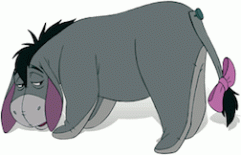Marc McCutcheon’s book Building Believable Characters is a great tool for writers to create believable characters. I’m in the section of the book called the PERSONALITY TRAITS INVENTORY. Today’s traits are Nervous, Depressed, Intelligent/Ignorant, and Boring/Eccentric.
For What It's Worth
The Literary Home of Sonja Hutchinson
Personality Traits: Nervous, Depressed, Intelligent/Ignorant, Boring/Eccentric
4 responses to “Personality Traits: Nervous, Depressed, Intelligent/Ignorant, Boring/Eccentric”
-
I would agree that the ‘sad sack’ will take a lot of work make into a strong protagonist – everyone likes to THROW pity parties, but no one likes to ATTEND them. 😉
Good thoughts on the intelligent/ignorant/boring/eccentric personalities – easy to make into stereotypes, easy to use as secondary character comic relief, but needs to be far more well-rounded to be a good main character.
The nervous/shy/submissive one got me thinking. It’s fun to play with fantasy and create a character with undesirable traits like these who magically becomes a confident, strong, outspoken person by the end of the book. However, it can be just as good (and perhaps more realistic) to, rather than having the character become a completely different person by the end of the book, instead have them find the way to overcome their struggles as the situation demands, though not necessarily change personality entirely. Example: I have a story in which the main character is spacey/forgetful and has a crippling phobia. At the end of the story, she’s still spacey/forgetful and has a crippling phobia – but in the climax, when people’s lives were on the line, she was able to find the courage to face that phobia and do what needed to be done in spite of her fear. It doesn’t mean the phobia magically went away, but when the situation demanded her to overcome that fear, she was able to find the strength to do so.
I’m not a fan of the American cultural concept in fiction/media that, if a protagonist has a character trait that is generally deemed ‘undesirable,’ then that trait must be gone from their personality by the end of the story (and might even be the whole point of the story – the person who was weird became ‘normal,’ huzzah!). It plays into the idea that only one type of person is allowed to be heroic – the confident, bold, assertive, dominant personality. And if your protagonist doesn’t fit that personality, then you better at least move them closer to that personality by the end of the book. I’m not personally a fan of this because I believe that heroism goes deeper than that. Maybe a shy person who has trouble speaking up for himself has to find the strength to speak boldly to resolve a problem – and that will be an awesome struggle and great work for him to overcome (in terms of story and character arc) – but does it mean he stops being a generally shy person entirely? Does that mean shyness is bad? Does it mean a person who is shy is inherently flawed and needs to be fixed? I’m not sure I’d say yes to any of those (barring shyness to a point of preventing, say, a basic level of normal functioning – a person who is so shy they can’t even step out of the house might consider working on that, for instance).
Loosely related: I love the recent Disney movie Frozen, and recently noticed the wonderful truism revealed in one of the songs (“Fixer-Upper,” a song about how a person might have their flaws, but love can ‘fix them up’).
“We’re not sayin’ you can change him,
‘Cause people don’t really change.
We’re only saying that love’s a force
That’s powerful and strange.
People make bad choices if they’re mad,
Or scared, or stressed.
Throw a little love their way.
…
And you’ll bring out their best.”I find these lyrics incredibly true. We like to fixate on the idea of ‘changing’ someone for the better, but that’s not typically a realistic expectation. But love can bring out the best in all of us.
-
Wonderful thoughts, Aggeloi. Thanks for sharing. I agree with you that negative personality traits don’t HAVE to change by the end of the story–but the one that stands in the way should at least be conquered at the critical moment. I haven’t seen the movie Frozen yet, but I will.
-
-
Another interesting thought: whether a personality trait will be interpreted as ‘negative’ or not will depend on culture, at least to some degree. Someone who is uncomfortable maintaining eye contact, doesn’t like to speak up, prefers not to talk to strangers, etc might be viewed as ‘stilted’ in America, but would be quite polite and proper in Japan.
-
Good point. In Greece, “personal space” is a foreign concept. It’s perfectly acceptable to stand ultra-close to the person you’re speaking with. In the US, if someone stands too close, we tend to back away.
-

Leave a reply to aggeloi Cancel reply